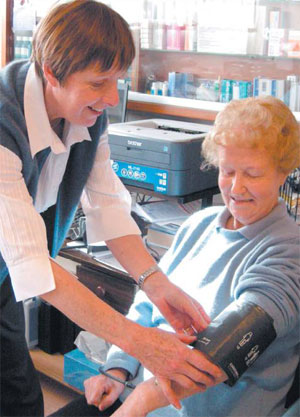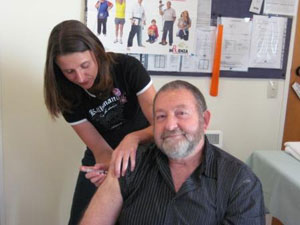Practice Nurse
Tasks & duties

Practice nurses may do some or all of the following:
-
assess peoples' health and carry out tests
-
plan and carry out health care for clients
-
provide advice and consultation in person and over the telephone
-
initiate first aid and emergency treatment
-
administer injections and immunisations
-
promote and teach health maintenance, and prevention of accidents and illness to clients
-
educate and provide information about health conditions such as asthma, diabetes and wound care management
-
prepare and assist with special procedures and minor surgery
-
take cervical smear tests or specialise in another area
-
set up screening programmes or clinics in conjunction with businesses or community agencies
-
provide ongoing screening programmes and clinics for clients
-
liaise with other health professionals within the general practice team and externally
-
provide counselling and support to help people make healthy lifestyle choices
-
provide a recall service reminding clients that they are due for an immunisation or smear test
-
keep records of clients and nursing services
-
order supplies and check and maintain equipment
-
act on behalf of clients as an advocate
-
participate in quality improvement activities such as carrying out audits of clinical practice, managing infection control, and participating in risk management groups that deal with patient complaints
Specialisations
Practice nurses may specialise in a particular area of health, including mental health, women's health, wound care, child health, aged care, or diabetes and asthma education.
Skills & knowledge

Practice nurses need to have:
-
excellent nursing skills and up-to-date knowledge of different nursing practices
-
knowledge of how the human body works
-
knowledge of different diseases and illnesses
-
knowledge of medicines and treatments, and the effect these have on patients
-
an understanding of nursing law and legislation
-
communication skills, including good listening skills
-
excellent time management and organisational skills
-
decision-making skills
-
problem-solving ability
-
observational and analytical skills
-
writing skills
-
computer skills
Entry requirements
To become a practice nurse you need to complete a Bachelor of Nursing. You also need to be registered with the Nursing Council of New Zealand, and have a current Annual Practising Certificate.
Practice nurses are also required to have a current cardio-pulmonary resuscitation (CPR) certificate, and a certificate of competence in vaccinations or cervical screening if they are specialising in these areas.
Secondary education
At least four years of secondary education is required to enter tertiary training, although five years is preferred. Useful subjects include English, maths, chemistry and biology.
Training on the job
Practice nurses undertake regular professional development by attending workshops and courses to remain up to date with new developments in nursing practice and health care. Their professional development may also include specialising in an area such as asthma or diabetes.
Useful experience
Any experience working in the health field is useful, as is work in rest homes, nursing homes or with people with disabilities.
Related courses
General Medicine
Hauora (Maori Health)
Nursing
For more information, please refer to Career Services.
Document Actions
